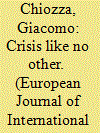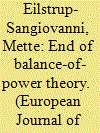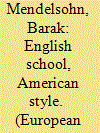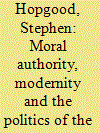|
|
|
Sort Order |
|
|
|
Items / Page
|
|
|
|
|
|
|
| Srl | Item |
| 1 |
ID:
090267


|
|
|
|
|
| Publication |
2009.
|
| Summary/Abstract |
This article tests a series of hypotheses that probe whether the crisis over Iraq has profoundly altered the popular perceptions of the United States abroad. Using survey data from Britain, France, Germany and Russia, this article shows that attitudes towards the United States were primarily shaped by the approval of President George W. Bush and of the American people themselves. More specific misgivings about the use of US power in the world entered into the cognitive calculus only as secondary factors. For substantial portions of the mass publics a dim view of the American people overshadowed all other considerations in the formation of a negative view of the United States. This finding suggests that a change of US administration would not be sufficient per se to alter popular attitudes towards the United States. For that to occur, views of the American people would have to improve as well.
|
|
|
|
|
|
|
|
|
|
|
|
|
|
|
|
| 2 |
ID:
090273


|
|
|
|
|
| Publication |
2009.
|
| Summary/Abstract |
The balance of power is one of the oldest and most venerable concepts in the study of International Relations. Few concepts have had a comparable influence on both scholarship and statesmanship, and few have been so fiercely contested. In a recent article, `Testing Balance-of-Power Theory in World History' (EJIR, June 2007), Wohlforth et al. set out to test balance-of-power theory against 2000 years of world history. Although their article has considerable merits, I highlight three main weaknesses in their approach. First, I argue that they misstate balance-of-power theory. Second, the competing theoretical hypotheses they offer are (a) not novel, (b) too vague to enable productive empirical testing. Third, the historical evidence they present, based on the study of ancient international systems, is too scant and impressionistic to be probative for the causal mechanisms they seek to evaluate. As a result, balance-of-power theory is neither refuted nor significantly refined.
|
|
|
|
|
|
|
|
|
|
|
|
|
|
|
|
| 3 |
ID:
090268


|
|
|
|
|
| Publication |
2009.
|
| Summary/Abstract |
This article addresses criticism that the English School fails to test empirically the validity of its main claims. The article takes a neglected yet highly significant aspect of the international society, its preservation-seeking quality, and tests it. It hypothesizes that if the international society truly exists and is inclined to act in order to guarantee its survival, its members should respond to threats to the existence of the society with rigorous collective action atypical of `normal politics'. To validate the hypothesis, the article examines the way in which members of the international society have responded to the systemic threat posed by the al Qaeda-led jihadi movement, focusing on the regime to suppress the financing of terrorism. Subsequently, the article lauds the theoretical contribution of the English School to understanding systemic threats, as well as its unique exposition of the war on terrorism
|
|
|
|
|
|
|
|
|
|
|
|
|
|
|
|
| 4 |
ID:
090270


|
|
|
|
|
| Publication |
2009.
|
| Summary/Abstract |
This article examines contemporary Japan's identity construction through the self/other lens, focusing on USSR/Russia as Japan's `other'. It identifies two main constitutive dimensions, political and socio-cultural, along which Japan's identity vis-a-vis the Soviet Union was constructed during the Cold War years. The origins and the nature of these constructs are examined in the first part of this case study. Unlike the existent Japan-related constructivist scholarship, this article argues that postwar Japan's identity had both domestic and international sources and that certain dimensions of the contemporary identity discourse can be traced to the prewar years. It also argues that the political and the socio-cultural identities, while overlapping in certain parts, led to different constructions of the Japanese `self'. The operation of these constructions in Japan's relations with post-communist Russia is examined in the second part of this article, with special attention paid to the territorial dispute which continues to haunt bilateral relations.
|
|
|
|
|
|
|
|
|
|
|
|
|
|
|
|
| 5 |
ID:
090265


|
|
|
|
|
| Publication |
2009.
|
| Summary/Abstract |
Capitalist modernity's paradox is to erode explicitly the social capital it relies on implicitly to mobilize people to act in concert when they share neither an identity nor an interest. Monetization and rules are the exemplary mechanisms for realizing modernity's aim of commensurability between all social qualities. Simmel helps us see this. But these abstractions create an authority vacuum. The experience of Amnesty International, emblem of modernity, is an example of efforts to overcome this. A close analysis of Amnesty shows that its authority is derived not from Kantian universalism but from a representation of the sacred that serves as a non-modern foundation for modernity. Even as attempts are made to profane this moral authority through commodification and politicization, we can see in the universalization of the Holocaust narrative a renewed effort at creating a singular global memory for humanity as a whole.
|
|
|
|
|
|
|
|
|
|
|
|
|
|
|
|
| 6 |
ID:
090264


|
|
|
|
|
| Publication |
2009.
|
| Summary/Abstract |
English School (ES) writers have never developed a systematic account of hegemony, and most set out with assumptions that are `antihegemonial'. The writings of Hedley Bull, in particular, appeared to reject any notion of a legitimate hegemony. However, a social theory of hegemony that emphasizes its consensual nature does appear consistent with other ES positions, particularly on the role of the Great Powers. This article excavates an ES theory of hegemony. It develops the argument for hegemony as a potential institution of international society, by analogy with the role of the Great Powers, and by extension of other ES principles. This stresses not just the material power of the Great Powers, but their degree of social recognition. Accordingly, it suggests that such a view of hegemony is no more paradoxical than, say, ES acceptance of war as a similar institution. This fills a major void in ES theory which otherwise has nothing of interest to say about international order in conditions of primacy.
|
|
|
|
|
|
|
|
|
|
|
|
|
|
|
|
|
|
|
|
|